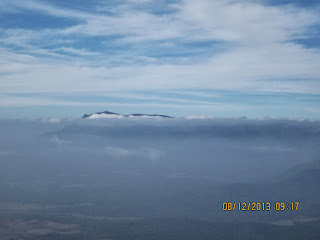 It
was about eight in the morning, when we began climbing Shivgiri hill, almost
immediately entering a dense wood of wet deciduous trees. Our host led the way, turning back frequently
to signal that we’d need to maintain silence, for our group was a chatty one. Walking in the Western Ghats is always a
bewildering experience, for there are so many species of plants and trees that
you cannot even begin to place in your memory and some that make you stare in wonderment:
a thick creeper with thorns big enough to rip your skin through, a flourescent
plant and trees with trunks thick enough (possibly belonging to the ficus
family) to need a jog-around to see the other side. This is hill with priceless wildlife as well:
small and large carnivore, deer and bear.
It
was about eight in the morning, when we began climbing Shivgiri hill, almost
immediately entering a dense wood of wet deciduous trees. Our host led the way, turning back frequently
to signal that we’d need to maintain silence, for our group was a chatty one. Walking in the Western Ghats is always a
bewildering experience, for there are so many species of plants and trees that
you cannot even begin to place in your memory and some that make you stare in wonderment:
a thick creeper with thorns big enough to rip your skin through, a flourescent
plant and trees with trunks thick enough (possibly belonging to the ficus
family) to need a jog-around to see the other side. This is hill with priceless wildlife as well:
small and large carnivore, deer and bear.
The
previous evening, driving up to our host’s place – located about halfway up the
hill - I had wondered aloud if he had cut the road through the hillside to his
property. “Iron ore miners,” he replied
briefly. There was no need to say more
for the curse that the mineral heaps upon its environment is well known.
The
evidence of iron in the mud and stone was everywhere on the hill, the
distinctive red-rust colour in the rock and the rich red colour of the
soil. When a friend fished out a magnet,
he was amazed to discover that a stone that he picked up at random stuck fast
to it.
The
hill originally had a coffee estate on it, and a couple of small farms. As the state of the coffee plantation
worsened, someone discovered the ore deposits all over the area. The price of land shot up as one speculator after
another sought to make a quick kill, the result being the usual demonstration
of avarice all around; even the priest of the local temple that had given the
hill its name, was not immune to the disease.
If
the miners had their way, this hill would have been history. So what had prevented this destruction? Some local stakeholders have fought a battle
in the court and won a reprieve for Nature, yet the war is not over. The week prior to our trip, a machine had
apparently come lumbering up to test the ore at a particular spot, so the threat
is omnipresent, yet the few brave men who have come thus far to protect the hill remain committed to their goal.
To
many – in India’s cities, in senior roles in large companies, in the media and
in critical decision-making roles in public policy – the stalemate at Shivgiri
would only be representative of ‘India’s policy paralysis’. Democracy, they intone, is our bane, for the
inclusiveness that the system and the Courts allow prevents economic
growth. Look at China, they then
continue, for an example of quick, firm action.
Quick action towards what? I ask.
Higher standard of living at a permanent cost to our water, soil and
air?
Do
we need to decimate this beautiful landscape, and the flora and fauna within
it, to export ore (again, to China) to enrich their economy and to further
empower the thugs who run mining businesses in India? Do we need to wipe out countless species to
make even more vehicles, in which we will continue to evaluate our windshield
view of the World, from airconditioned comfort?
Much
of this ‘growth-at-any-cost’ opinion is from people who have no idea whatsoever
of what we will lose, for they canter from airplane to conference to meeting to
airplane, seeking solace in the comfort of numbers such as GDP and growth rate
percentages, and are as isolated from the real World as the Sultan of Brunei;
these are folks so convinced of their perspective that they see any system of
checks and balances as obstructionist. If this is not living in an ivory tower,
pray what is? Sadly, this includes the highest leadership in the country
today – business and political leadership - who, while they speak in the
English of the elite, use the language of the ignorant. This is the leadership that has rejected the
Gadgil report’s intelligent, reasoned plea to protect the Western Ghats from
further mining, dams, polluting industry, such as refining and deforestation. ..…and
they will justify all of this with
“Citizens,
for you
It’s
this we do
For
power is a Nation’s legs
Ignore
the carnage
The
collateral damage
An
omelette needs broken eggs.”
As
we reached the top of the hill, the mist engulfed us in one rapturous moment
and cleared as quickly as it had come.
The view of Kemmangundi on a bright December morning, above the
mist-and-clouds, was magnificient and my mood lit up in sync as well.
Nature
can overwhelm like nothing else. After
some chatter and excitement, we settled down to the view, each lost in thought, even as Chief Seattle’s words came back to me, again
and again: Rich men, he said wisely, know the price of everything, but the value of nothing.
If Shivgiri has a tale to tell, it is that fighting for what one believes in is the only way.
